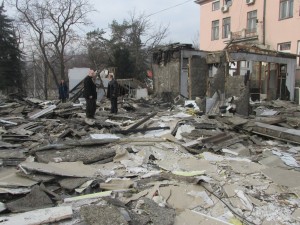
Zlatan and Smail Velagic of Tuzla Kvarc stand amidst the rubble of their office building, which was burned and demolished in October 2015 after they exposed a government bribery scheme. (photo: Mark Worth)
By Mark Worth
Coalition Co-coordinator
This is a story of corruption, whistleblowing, retaliation and broken lives. It is not an easy story to stomach. But it is an essential story. It highlights, all too graphically, what we in the whistleblower protection movement are fighting for – and why.
Soft-spoken and humble, Smail Velagić has been the director of the Bosnian mining company Tuzla Kvarc for 29 years. The company employs 50 people in the country’s third-largest city, Tuzla, the economic, scientific and educational center of northeastern Bosnia.
On May 7, 2015 Tuzla’s Assistant Minister of Industry, Energy and Mining was arrested for accepting a €5,000 installment from a €15,000 bribe he demanded to grant Tuzla Kvarc a license to mine for quartz sand. Velagić’s son Zlatan himself assisted investigators in the successful sting operation. Photos of the handcuffed official being led away by police made national news.
Classic Retaliation
The retaliation against Tuzla Kvarc was swift and vicious. Tax officials seized some of the company’s property. Police began carrying out nuisance inspections. Its administrative offices were burned, ransacked and demolished to bits by unknown persons. Company workers have not been paid since January 2015.
Authorities ordered the company to halt its mining operations because it did not have a license. Prosecutors then criminally charged Smail Velagić and the company with stealing sand out of the ground without a license. Both actions are absurd, because the reason Tuzla Kvarc did not have a license is because Velagić refused to pay a bribe.
“The case of Tuzla Kvarc is the breaking point of my hope that this is a normal country.”
– Bojan Bajić, Center for Responsible Democracy-Luna, Sarajevo
Almost overnight, a company that was once the pride of Tuzla was brought to its knees. Said Velagić, “We entered into the jaws of a bureaucrat who used to say, ‘All can be done – but what’s in it for me?’ ”
“What happened to Tuzla Kvarc seems like a film. Like a dream you can’t even dream,” he said. “You can’t imagine even if you wanted to.”
Velagić’s saga from whistleblower to retaliation victim is chronicled in the newly released documentary, Cijena Pravde (The Price of Justice). The film was produced by Bojan Bajić of the Center for Responsible Democracy-Luna, a founding member of the Southeast Europe Coalition on Whistleblower Protection.
The film follows the path of Velagić, his crew and their families as they try to pick up the pieces of their besieged company. In solidarity with a trade union, workers maintained a protest in front of Tuzla’s government offices for 51 days until police dissolved the encampment.
The World is Watching
Following suicide threats and an 18-day hunger strike by employees, an agreement was reached on April 28 between Tuzla Kvarc and government officials to allow the company to resume operations and put its employees back to work.
But the struggle is not yet over. A worldwide campaign, to which more than 12,000 people have responded, continues to urge Bosnian officials to drop all remaining actions against Tuzla Kvarc. Support for Tuzla Kvarc is being led by Coalition member Center for Responsible Democracy-Luna (COD-Luna), with support from Blueprint for Free Speech.
Bajić, who runs COD-Luna’s whistleblower protection program, has been active in politics and activism in Bosnia for 14 years. “I did not know that this kind of coordinated aggression by a bureaucracy – in the name of the law – was possible,” he said. “Our government is inefficient, but when it comes to retaliation it can function in perfect harmony. If they want to do something bad, it’s no problem.
“I thought I knew the bottom line of the black hole. Now I see that the situation is much deeper,” said Bajić. “The case of Tuzla Kvarc is the breaking point of my hope that this is a normal country.”
Small Velagic of Tuzla Kvarc retells the events leading up to the destruction of his office building by unknown perpetrators in October 2015. (video: Mark Worth)

